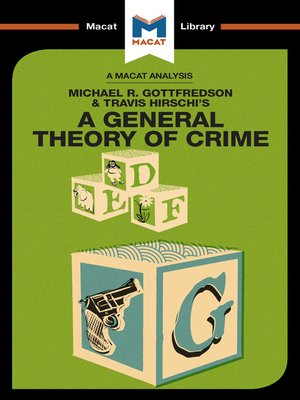An Analysis of Michael R. Gottfredson and Travish Hirschi's a General Theory of Crime
ebook ∣ The Macat Library
By William J Jenkins

Sign up to save your library
With an OverDrive account, you can save your favorite libraries for at-a-glance information about availability. Find out more about OverDrive accounts.
Find this title in Libby, the library reading app by OverDrive.



Search for a digital library with this title
Title found at these libraries:
| Library Name | Distance |
|---|---|
| Loading... |
Michael R. Gottfredson and Travish Hirschi's 1990 A General Theory of Crime is a classic text that helped reshape the discipline of criminology. It is also a testament to the powers of clear reasoning and interpretation.
In critical thinking terms, reasoning is all about presenting a solid and persuasive case – and as many people instinctively understand, the most persuasive reasoning is that which bases itself on a single, simple hook. In Gottfredson and Hirschi's case, this hook was what has come to be known as the "self-control theory of crime" – the idea that the tendency to commit crime is directly related to an individual's level of self-control.
While the dominant schools of thought of the time tended to focus on crime as the product of complex environmental factors, with little attempt to unify different theories, Gottfredson and Hirschi sought to interpret things so as to provide a single overarching concept that explained why crimes of all sorts were committed. Moreover, while other theories of crime concentrated on understanding and explaining specific types of law-breaking, the self-control model could, in Gottfredson and Hirschi's view, be seen as the basis for understanding the root cause for all crime in all contexts. While such simplicity inevitably attracted as much criticism as agreement, subsequent studies have provided real-world corroboration for the General Theory's persuasive reasoning.







